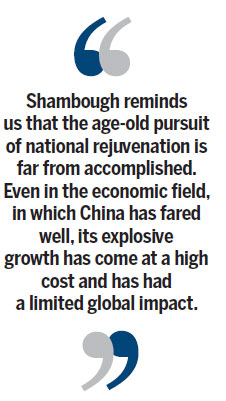Damping down China's rejuvenation
Updated: 2013-08-09 09:19
By Cheng Xiaohe (China Daily)
|
|||||||||||

A new book asks not when the Chinese will rule the world but whether they will ever get to the top
In his well-known book, When China Rules the World: The End of the Western World and the Birth of a New Global Order, Martin Jacques claims that China's impact on the world will be profound, and in the long term China will seek "to transform that system while at the same time, in effect, sponsoring a new China-centric international system which will exist alongside the present system and probably slowly begin to usurp it".
Jacques' bullish statement raises the expectation that China may come to dominate the world in the not-too-distant future. However, David Shambaugh, a leading expert in the field of contemporary China studies in the United States, pours cold water on such an upbeat sentiment.
In his newly released book, China Goes Global: the Partial Power, Shambaugh systematically examines China's global impact in economic, political, military and cultural fields.
Although he acknowledges that China's rise is a "big story of ouEuropean Weeklyr time", he draws conclusions: China is a partial power and the elements of China's global power are actually surprisingly weak and very uneven; China is not as important, and it is certainly not as influential, as conventional wisdom holds; China has a very long way to go before it becomes - if it ever does - a true global power and it will never "rule the world".
As a thoughtful scholar, Shambaugh's sector-by-sector diagnosis is incisive, straightforward and even inspiring to some Chinese, who truly cheer their nation as a rising great power. But he also believes China is a reactive, lonely power and has "very little influence on global cultural trends, minimal soft power and a mixed-to-poor international image".
Standing in sharp contrast with many scholastic books, which pay more attention to China's rising power, Shambaugh's book reveals the downside of China's performance on the world stage. Even though this assessment could make many Chinese uncomfortable - as an old Chinese saying goes, good medicine tastes bitter to the mouth, faithful words are contrary to the ears - Shambaugh's diagnosis reads like a wake-up call for many Chinese, who love to celebrate their nation's remarkable economic achievements.
Shambaugh reminds us that the age-old pursuit of national rejuvenation is far from accomplished. Even in the economic field, in which China has fared well, its explosive growth has come at a high cost and has had a limited global impact.
Although Shambaugh's cool-headed assessment will make some excited Chinese calm down, it is not without its problems.
First, Shambaugh grades China's global positions and influences according to Western benchmarks.
Undoubtedly, Shambaugh is more concerned with China's power relative to the United States, as the latter is still the world's leading superpower. His conclusions certainly could help to assuage anxiety among US elites, triggered by China's rapid rise. However, such a method is problematic on three counts: China's momentous achievements are selectively played down; there is no detailed breakdown of China's global impact in each of the sectors explored; and there is no scientific barometer to gauge how global is global for nations such as China.
With these problems in mind, to describe the world's second-largest economy as a partial global power seems arbitrary.
Second, Shambaugh delivers his verdict on China's global status in a static fashion. China is big in terms of population and territory, but it was quite weak in the early years of the People's Republic of China. Since China carried out the reform and opening-up policy, it began to transform itself from an isolated and backward land to an economic powerhouse. China's political and military global standing have also improved significantly. Even though its economic growth has slowed a little in the past two years, its current growth rate easily dwarfs those of other major economies.
The power gap between China and the US continues to shrink. Even if we acknowledge that China is a partial power in many sectors, as Shambaugh maintains, it might be more convincing to conclude that China is a growing partial power, which may become a fully fledged one in the years to come.
The author is deputy director of the Center for China's International Strategic Studies at Renmin University of China.
(China Daily European Weekly 08/09/2013 page9)
Today's Top News
List of approved GM food clarified
ID checks for express deliveries in Guangdong
Govt to expand elderly care
University asks freshmen to sign suicide disclaimer
Tibet gears up for new climbing season
Media asked to promote Sino-Indian ties
Shots fired at Washington Navy Yard
Minimum growth rate set at 7%
Hot Topics
Lunar probe , China growth forecasts, Emission rules get tougher, China seen through 'colored lens', International board,
Editor's Picks

|

|

|

|

|

|





